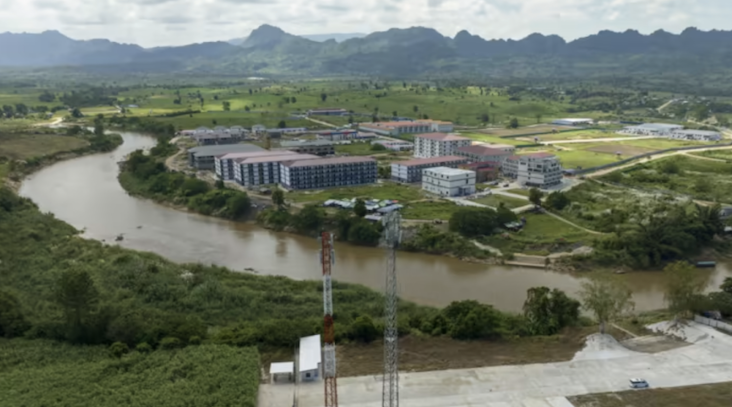The US government has sanctioned a notorious militia in southeast Myanmar and a financial institution in Cambodia after declaring that they play key roles in Southeast Asia’s booming cyber scam operations.
The US Treasury imposed sanctions on the Karen National Army (KNA) – a militia allied to the Myanmar military – plus its leader Chit Thu and his two sons on Monday, because of their roles in “facilitating cyber scams that harm US citizens, human trafficking, and cross-border smuggling.”
The KNA enclave, on the Thai-Myanmar border, “is home to multiple cyber scam syndicates, and the KNA has benefitted from its connection to Burma’s military in its criminal operations. Although statistics vary, American victims of cyber scams like the ones emanating from Burma have collectively lost billions of dollars over the last three years,” it said.
ALSO SEE: China Cuts Rates, Injects Liquidity as Trade Meet With US Looms
The KNA is the latest name for a group originally known as the DKBA (Democratic Karen Buddhist Army), which split in 1994 from the Karen National Union – an ethnic resistance group that has battled the Burmese military since the late 1940s.
The breakaway group was notorious for attacks on refugee camps near the Thai border in the late 1990s, before it became a Border Guard Force led by Chit Thu and allied to the generals in Naypyidaw about 15 years ago.
In recent years it has leased land to Chinese and other criminal groups and supported human trafficking, smuggling and scam operations by providing security at scam compounds, where survivors report that guards wore KNA insignia, the Treasury said in its statement.

“Under Saw Chit Thu’s leadership, the KNA has become a key enabler of scam operations in the region, providing security at compounds and leasing land to criminal organizations while profiting handsomely at the expense of scam victims and of the otherwise innocent people forced to carry out these crimes,” it said.
The US action is nothing new for Chit Thu, who was sanctioned by the United Kingdom in 2023 and the European Union in 2024 for the huge expansion of criminal activity in his area, plus his military ties with Burma’s unpopular military regime.
Washington also imposed sanctions on his sons, Saw Htoo Eh Moo and Saw Chit Chit, who are also officers in the KNA and allegedly have interests in the group’s business ventures.
The Treasury said a significant portion of cyber scam operations targeting Americans and others around the globe emanate from Southeast Asia.
It said scammers “are often themselves lured or trafficked into prison-like call centres or retrofitted hotels and casinos,” then forced — with threats of physical violence and humiliation — into scamming strangers online, often entangling them in elaborate schemes that drag out for months.
“Estimates indicate Americans are suffering increasing financial losses as a result of these sophisticated cyber scams emanating from Burma and other Southeast Asian countries, amounting to over $2 billion in 2022 and $3.5 billion in 2023.”
A spokesman for the KNA told Irrawaddy, a prominent Myanmar exile media outlet based in Chiang Mai, that the US claims were baseless.
However, NGOs working on Burma issues in Thailand and many analysts have welcomed the news.

The latest move followed news last week that the US Treasury’s Financial Crimes Enforcement Network (FinCEN) had found the Cambodia-based Huione Group was a “primary money laundering concern” for criminal groups in North Korea and Southeast Asia – and should be barred from the US financial system.
“Huione Group serves as a critical node for laundering proceeds of cyber heists carried out by the Democratic People’s Republic of Korea, and for transnational criminal organizations in Southeast Asia perpetrating convertible virtual currency (CVC) investment scams, commonly known as ‘pig butchering’ scams, as well as other types of CVC-related scams,” it said on May 1.
“Huione Group has established itself as the marketplace of choice for malicious cyber actors like the DPRK and criminal syndicates, who have stolen billions of dollars from everyday Americans,” Treasury Secretary Scott Bessent said.
“Today’s proposed action will sever Huione Group’s access to correspondent banking, degrading these groups’ ability to launder their ill-gotten gains. Treasury remains committed to disrupting any attempt by malicious cyber actors to secure revenue from or for their criminal schemes.”

The scam centres on the Thai-Myanmar border and in Cambodia became a key concern for Thai authorities this year after a Chinese actor was abducted and taken to a scam centre, before being rescued in January.
That drama received considerable publicity in Thailand and China, and became a crisis for the tourism industry because of perceived risks about travelling to the Kingdom.
Pressure from Beijing and Bangkok on Chit Thu spurred the release of more than 8,500 Chinese and other foreign citizens held in compounds near Myawaddy in February and March.
But many more people are said to remain in scam centres in that area. Analysts believe funds raised by the scam centres are a key source of revenue for the Myanmar regime, which has faced military defeats by ethnic resistance groups all across the north of the country.
And even after a huge earthquake near Mandalay on March 28, which killed close to 4,000 people, fighting has continued. UN officials say more than 6.3 million people are in need of assistance in areas hardest hit by quakes, which are still occurring.
Say a prayer for Myanmar; her people could use it.
- Jim Pollard
NOTE: The caption to the Huione Group photo was amended on May 9, 2025.
ALSO SEE:
Cyber Scam Hubs Spread From Asia Like a Global Cancer: UN
Thousands in Limbo as Thailand Fights Scam Hubs on Two Fronts
Scam Centre’s Abduction of Chinese Actor a Blow For Thai Tourism
SE Asia Crime Networks Rely on Telegram, Crypto, UN Says
Weak ASEAN Nations ‘at Risk of Evolving Into Scamming States’
‘US to Sanction Prominent Cambodians Tied to Scam Centres’
N Korean Hackers Used Cambodian Firm to Launder Stolen Crypto
Cambo-Chinese Firm Tied to Crypto Scams, Money Laundering
Scamming Compounds in SE Asia Stole $64 Billion in 2023: Report
High-Tech Asian Crime Wave: Cyber Scams, Casinos Loot Billions
Big Tech ‘Doing Little’ to Counter Rampant Scams on Social Media
Crime Gangs Control Some Myanmar, Laos Economic Zones: UN
























